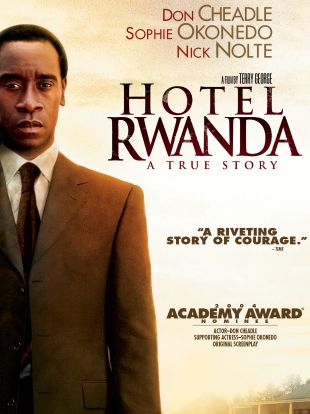
Terry George's powerful Hotel Rwanda has more than a passing similarity to Schindler's List. Both films feature a smooth-talking protagonist who gradually develops a powerful conscience, to the point where he will risk his own life to save strangers. Both films also focus on a relatively uplifting and hopeful side story to an overwhelming real-life tragedy. In the end, though, Hotel Rwanda is not about one great man. George conveys the horrific scale and barbarity of the Rwandan massacre with grace and efficiency, while eschewing graphic violence, and showing mainly its results. The redoubtable Don Cheadle delivers a passionate yet nuanced performance. But perhaps the film's greatest strength is that it manages to convey the context, both historical and global, in which these events took place without relying heavily on titles or obvious exposition. A simple scene in which Paul Rusesabagina (Cheadle) explains the origins of the conflict between Hutus and Tutsis to a reporter (Joaquin Phoenix) effectively conveys the situation's roots in colonialism and its contemporary absurdity, heightening the sense of tragedy. Phoenix's reporter has a key line later in the film, when he tells Paul that people will look at the terrible images he's captured on videotape that day, "say, 'Oh, that's horrible,' and then go back to their dinners." Hotel Rwanda is not a perfect drama. It's disappointingly conventional in its use of music, for example, and there is at least one moment of high drama that seems tasteless in contriving suspense. But it's an important film nevertheless that brings this critical juncture in recent history to vibrant life, and boldly implicates its audience in the tragedy it depicts, in an effort to make us examine our own responsibility as citizens of the world.
